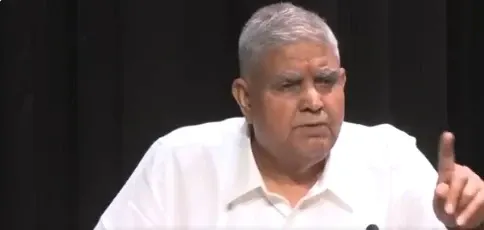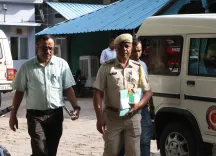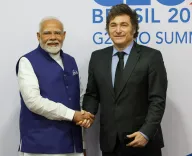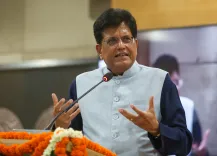Is V-P Dhankhar Really Under Pressure? A Response to Ashok Gehlot

Synopsis
Key Takeaways
- V-P Dhankhar asserts independence from pressure.
- Importance of dialogue in democracy.
- Call for high standards in legislative conduct.
- Former legislators' role in guiding democracy.
- Concerns over the erosion of democratic values.
Jaipur, June 30 (NationPress) Vice-President (V-P) Jagdeep Dhankhar addressed remarks made by former Rajasthan Chief Minister Ashok Gehlot on Monday, suggesting that both the Lok Sabha Speaker Om Birla and the Vice-President are experiencing pressure.
In response to Gehlot's insinuation, V-P Dhankhar firmly stated, "I am not under anyone's pressure. I neither exert pressure nor do I come under pressure."
During a gathering organized by the Ex-MLAs Association at the Constitution Club in Jaipur, the Vice-President directly confronted Gehlot's comments, clarifying, "When a state government does not align with the Centre, allegations of pressure are often made. I want to make it clear that I am not working under any pressure."
He expressed concern not for himself but for Gehlot, saying, "In Rajasthan politics, he has been my oldest friend and a well-wisher. Our families also share a deep bond. Since he made a public statement, I'm responding publicly -- he need not worry. I work independently and freely."
V-P Dhankhar also supported Lok Sabha Speaker Om Birla, remarking, "He cannot be under pressure. And how can a person who drinks the water of Rajasthan ever come under pressure? We work hard even in the toughest of situations."
He quoted former Rajasthan Governor Haribhau Kisanrao Bagde, noting his extensive political experience, stating, "The Governor of Rajasthan, Haribhau Kisanrao Bagde ji, has been an MLA six times, served as Speaker of the Rajasthan Assembly, and has also been a Minister in the state government."
Dhankhar added, "What he said is absolutely accurate -- when the Governor is in the state, he often becomes a punching bag."
He pointed out that "If the state government is not aligned with the Centre, it becomes convenient to make accusations. Over time, this tendency has expanded -- even the Vice-President and the President have been drawn into such allegations."
Expressing concern over the situation, V-P Dhankhar emphasized, "In my view, this is not right."
Speaking from the dais in Rajasthan, he highlighted the personal nature of his remarks, stating, "I say this here, on the soil of Rajasthan, because this was said by a close and long-time friend. I have closely observed the work of Lok Sabha Speaker Om Birla ji -- and I can say with conviction that he cannot be influenced or come under pressure. I work very closely with him."
He underscored India's economic progress, asserting, "India was once among the five fragile economies of the world. Today, it ranks among the four largest. The kind of progress India has made in the past decade has not been matched by any other major country."
Addressing the essence of democracy, he reiterated the importance of political dialogue, stating that the Opposition is not an enemy and emphasizing the necessity for debate and discussion.
"Expression is the lifeblood of democracy," he remarked. "If we reach a point where the opinion of others holds no value, then democracy loses its meaning. Listening to different viewpoints only makes us stronger."
V-P Dhankhar clarified that his statements were non-political, adding, "Every period in India's journey has seen progress. We should not compare one era with another. Instead, we should see how India has emerged on the global stage."
He appealed for high standards in Legislative Assemblies, stating, "These institutions, often referred to as the temples of democracy, are expected to reflect the dignity, decorum, and discipline that democracy demands."
He expressed concern over current behaviors within these halls, stating, "It is troubling to witness conduct that erodes the sanctity of these institutions. If such practices continue, the public may begin to lose faith in the very foundations of our democratic structure. When respect fades in the temple of democracy, people may stop entering -- they may begin looking elsewhere for leadership and trust."
Emphasizing the challenge this poses to democracy, he suggested that the solution lies in raising awareness and ensuring accountability.
V-P Dhankhar encouraged former legislators to play a pivotal role, stating, "With their experience, wisdom, and moral authority, they can guide the present and inspire the future -- helping to restore and uphold the standards that our democracy deserves."






